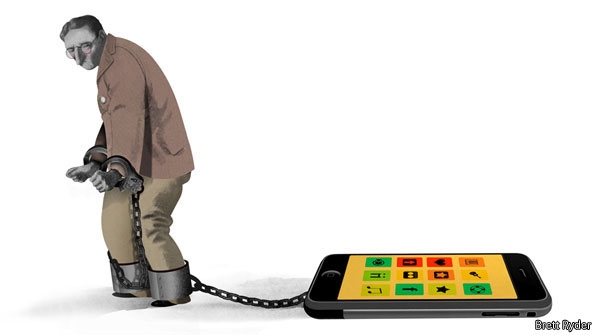沦为智能手机的奴隶
The horrors of hyperconnectivity—and how to restore a degree of freedom
超度连接造成了恐慌:我们如何重获自由
Mar 10th 2012 | from the print edition
 前天 19:40 上传
前天 19:40 上传下载附件 (43.48 KB)
“THE SERVANT” (1963) is one of those films that it is impossible to forget—a merciless dissection of the relationship between a scheming valet (played by Dirk Bogarde) and his dissolute master (James Fox). The valet exploits his master’s weaknesses until he turns the tables: the story ends with a cringing Fox ministering to a lordly Bogarde. The film was an indictment of the class structure of Harold Macmillan’s Britain. But it is hard to watch it today without thinking of another fraught relationship—the one between businessfolk and their smartphones.
Smart devices are sometimes empowering. They put a world of information at our fingertips. They free people to work from home instead of squeezing onto a train with malodorous strangers. That is a huge boon for parents seeking flexible work hours. Smartphones and tablets can also promote efficiency by allowing people to get things done in spare moments that would otherwise be wasted, such as while queuing for coffee. They can even help slackers create the illusion that they are working around the clock, by programming their e-mail to be sent at 1am.
But for most people the servant has become the master. Not long ago only doctors were on call all the time. Now everybody is. Bosses think nothing of invading their employees’ free time. Work invades the home far more than domestic chores invade the office. Otherwise-sane people check their smartphones obsessively, even during pre-dinner drinks, and send e-mails first thing in the morning and last thing at night.
This is partly because smartphones are addictive: when Martin Lindstrom, a branding guru, tried to identify the ten sounds that affect people most powerfully, he found that a vibrating phone came third, after the Intel chime and a giggling baby. BlackBerrys and iPhones provide relentless stimuli interspersed with rewards. Whenever you check the glowing rectangle, there is a fair chance you will see a message from a client, a herogram from your boss or at least an e-mail from a Nigerian gentleman offering you $1m if you share your bank details with him. Smartphones are the best excuse yet devised for procrastination. How many people can honestly say that they have never pruned their e-mails to put off tackling more demanding tasks?
Hyperconnectivity exaggerates some of the most destabilising trends in the modern workplace: the decline of certainty (as organisations abandon bureaucracy in favour of adhocracy), the rise of global supply chains and the general cult of flexibility. Smartphones make it easier for managers to change their minds at the last moment: for example, to e-mail a minion at 11pm to tell him he must fly to Pittsburgh tomorrow. The dratted devices also make it easier for managers in one time zone to spoil the evenings of managers in another.
Employees find it ever harder to distinguish between “on-time” and “off-time”—and indeed between real work and make-work. Executives are lumbered with two overlapping workdays: a formal one full of meetings and an informal one spent trying to keep up with the torrent of e-mails and messages.
None of this is good for businesspeople’s marriages or mental health. It may be bad for business, too. When bosses change their minds at the last minute, it is hard to plan for the future. And several studies have shown what ought to be common sense: that people think more deeply if they are not constantly distracted.
What can be done to keep smartphones in their place? How can we reap the benefits of connectivity without becoming its slaves? One solution is digital dieting. Just as the abundance of junk food means that people have to be more disciplined about their eating habits, so the abundance of junk information means they have to be more disciplined about their browsing habits. Banning browsing before breakfast can reintroduce a modicum of civilisation. Banning texting at weekends or, say, on Thursdays, can really show the iPhone who is boss.
Together we can outsmart our phones
团结起来 我们就能翻身做主人
The problem with this approach is that it works only if you live on a desert island or at the bottom of a lake. In “Sleeping with Your Smartphone”, a forthcoming book, Leslie Perlow of Harvard Business School argues that for most people the only way to break the 24/7 habit is to act collectively rather than individually. She tells the story of how one of the world’s most hard-working organisations, the Boston Consulting Group, learned to manage hyperconnectivity better. The firm introduced rules about when people were expected to be offline, and encouraged them to work together to make this possible. Many macho consultants mocked the exercise at first—surely only wimps switch off their smartphones? But eventually it forced people to work more productively while reducing burnout.
Ms Perlow’s advice should be taken seriously. The problem of hyperconnectivity will only get worse, as smartphones become smarter and young digital natives take over the workforce. People are handing ever more of their lives over to their phones, just as James Fox handed ever more of his life over to Dirk Bogarde. You can now download personal assistants (such as Apple’s Siri) that tell you what is on your schedule, and virtual personal trainers that urge you take more exercise. Ofcom, Britain’s telecommunications regulator, says that a startling 60% of teenagers who use smartphones describe themselves as “highly addicted” to their devices. So do 37% of adults.
The faster smartphones become and the more alluring the apps that are devised for them, the stronger the addiction will grow. Spouses can help by tossing the darned devices out of a window or into a bucket of water. But ultimately it is up to companies to outsmart the smartphones by insisting that everyone turn them off from time to time.




 雷达卡
雷达卡

















 京公网安备 11010802022788号
京公网安备 11010802022788号







